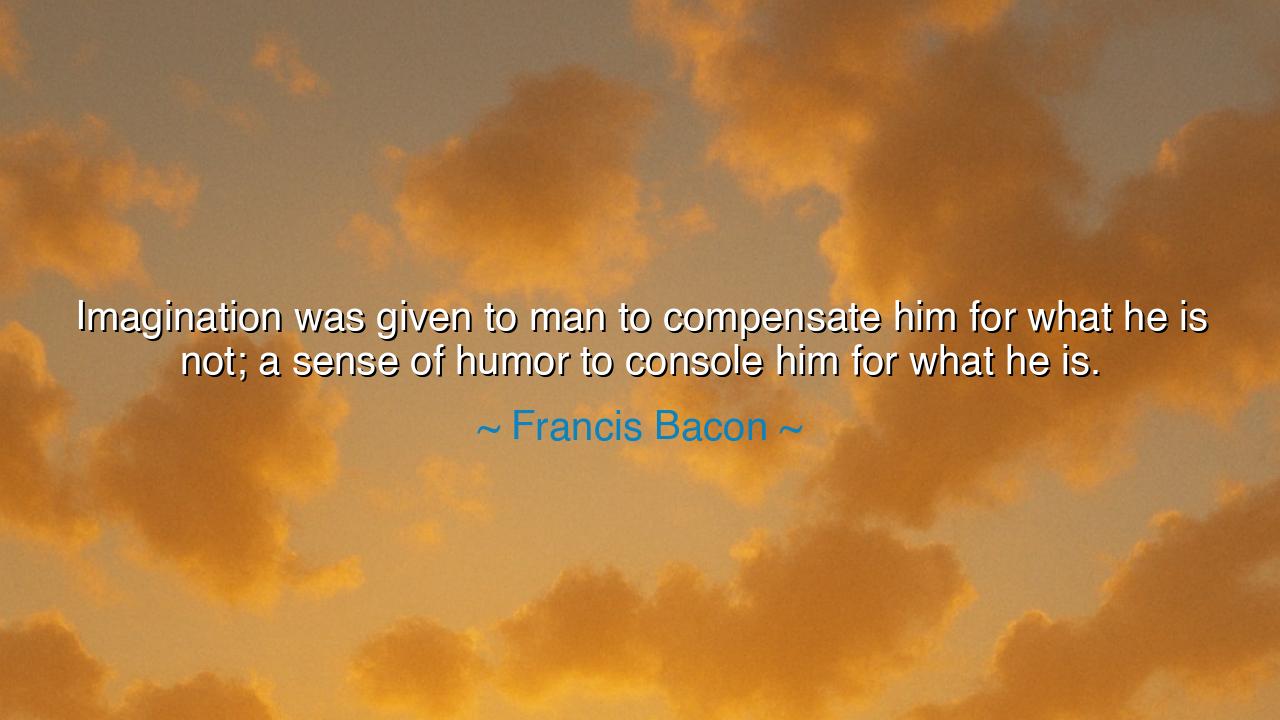
Imagination was given to man to compensate him for what he is
Imagination was given to man to compensate him for what he is not; a sense of humor to console him for what he is.






In the quiet dawn of human thought, when philosophers still sought to understand the depths of the human soul, Francis Bacon, the great English thinker and father of modern science, spoke words that glimmer with timeless wisdom: “Imagination was given to man to compensate him for what he is not; a sense of humor to console him for what he is.” In this single sentence, Bacon laid bare the twin forces that sustain the human spirit — imagination and humor, those divine gifts that both elevate and soothe the soul. For imagination lifts man toward the heavens, while humor steadies him upon the earth.
Imagination, said Bacon, was given to man to compensate for what he is not. It is the ladder by which mortals climb toward their better selves, the bridge between limitation and possibility. Through imagination, humanity creates worlds unseen — it dreams of justice where there is cruelty, of peace where there is chaos, of beauty where there is dust. It is imagination that gave birth to art, to science, to civilization itself. Without it, man would be a creature trapped by his senses, unable to rise beyond the immediate or aspire to the eternal. In every great act of progress, it is imagination that whispers, “There is more.”
And yet, imagination alone would make man restless — forever yearning, never content. So, to balance this boundless dream, the Creator, in Bacon’s words, bestowed upon him another sacred gift: a sense of humor, to console him for what he is. Humor is the gentle light that softens the truth of our imperfection. It teaches us to laugh at folly — our own and others’ — and to find grace in failure. Without humor, man’s pursuit of greatness would become tyranny upon himself. Humor is the soul’s sigh of relief, the reminder that we are human, not gods — and that this, too, is a kind of glory.
History itself has borne witness to this delicate balance. Consider Abraham Lincoln, a man burdened with the weight of civil war and the sorrow of a divided nation. Yet in his darkest hours, when the fate of millions pressed upon his shoulders, he turned to humor. His laughter was not triviality but wisdom. It steadied him, reminded him of the simple humanity that still bound friend and foe alike. “If I did not laugh,” he once said, “I should die.” In his laughter lived the strength to endure, and in his imagination — the dream of a nation reborn. Thus, Bacon’s truth finds flesh in the lives of the great: to dream boldly and laugh humbly is the way of balance.
Imagination and humor, then, are not opposites but companions — one reaching upward, the other grounding the soul. The dreamer without humor becomes lost in illusion; the realist without imagination becomes prisoner to despair. Together, they form the essence of wisdom: to strive for what could be while smiling at what is. This is the art of living well — to aim for the stars while laughing kindly at our own stumbling feet.
The ancients understood this harmony. Socrates, known for his wit as much as his wisdom, used humor to guide his students toward truth. When others grew proud in their learning, he reminded them — often with a jest — that the greatest wisdom is to know how little we truly know. In that laughter was humility, and in that humility was light. For humor does not destroy dignity; it refines it. It allows wisdom to speak without arrogance and truth to be received without bitterness.
So, dear listener, take this teaching as a lamp for your path: cultivate both imagination and humor, for they are the wings and heart of the human spirit. Let imagination stir your dreams, daring you to become more than you are. But when the weight of imperfection presses upon you, let humor restore your peace, reminding you that even the flawed can be radiant. To dream without laughing is to forget your humanity; to laugh without dreaming is to forget your destiny. Together, they make life bearable — and beautiful.
And thus, as Francis Bacon taught, imagination makes us reach for the divine, but humor makes us content to be human. Treasure both, and you shall walk the earth both light of heart and noble of purpose — a mortal with the courage to dream, and the wisdom to smile.






AAdministratorAdministrator
Welcome, honored guests. Please leave a comment, we will respond soon